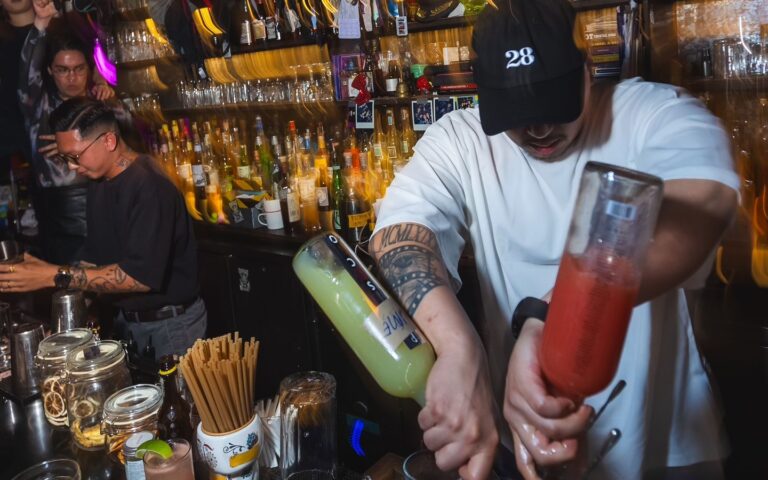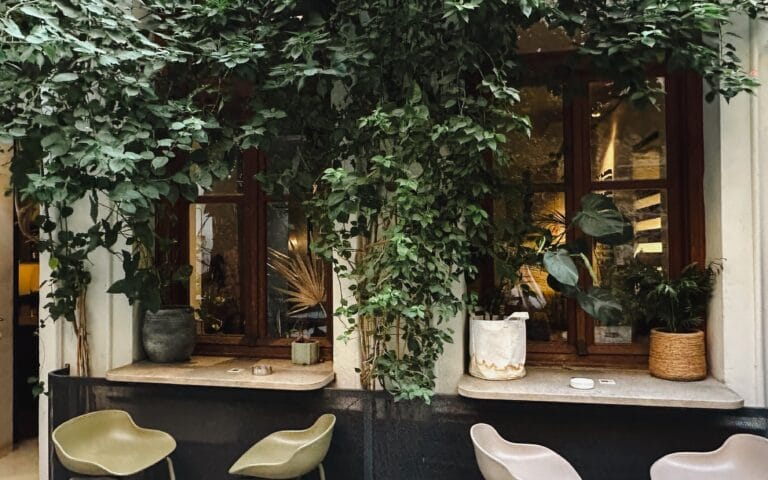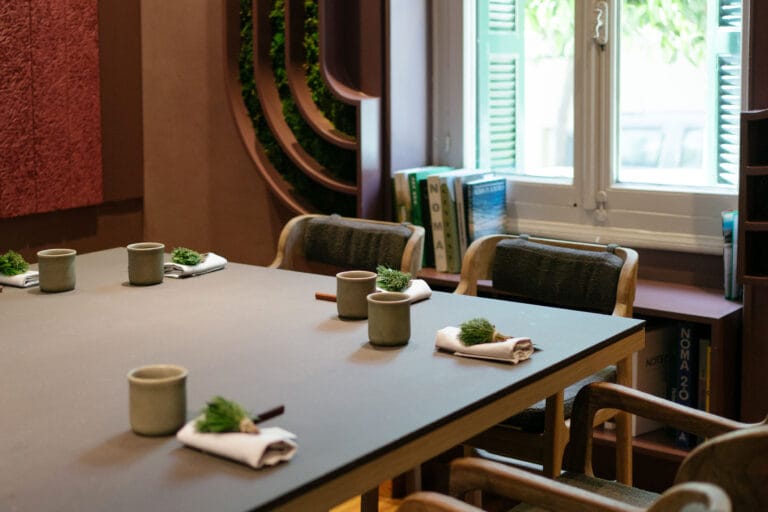Crumbling courtyards to converted factory spaces, Budapest’s secret bar scene blends raw industrial heritage with grassroots culture.
While Budapest’s ruin bars put the city on the global nightlife map – those charmingly disheveled venues carved from abandoned buildings in the 2000s – the Hungarian capital’s drinking scene has evolved into something far more nuanced. Yes, tourists still queue for Instagram-famous spots and cocktail enthusiasts seek out high-end speakeasies, but there’s a fascinating middle ground that most visitors never discover.
These hidden bars, known primarily to locals, tap into the city’s rich history without resorting to performative grunginess or premium price tags. Tucked behind unmarked doors and nestled in century-old courtyards, they channel the grandeur of the Austro-Hungarian empire, the intrigue of the communist era, and the creative energy of modern Budapest – all without trying too hard. Neither fully ruin bar nor strictly speakeasy, these venues offer an authentic slice of Hungarian drinking culture quietly thriving away from the tourist trail.
Hintaló

Hintaló captures the soul of Budapest’s alternative bar culture, beyond the tourist-filled ruin pubs. Behind an unassuming façade, this two-story bar captures the district’s transformation from rough-around-the-edges past to cultural frontier, with its vintage furnishings and warm, lived-in atmosphere serving as a perfect backdrop for the neighborhood’s evolution.
The space feels like stepping into a local’s living room, complete with mismatched furniture, retro posters, and mood lighting that creates an intimate vibe throughout both floors. While the well-curated Czech beers and creative tapas platters – including some unexpected Asian fusion bites – keep hunger at bay, it’s the charismatic staff and eclectic crowd of artists, students, and neighborhood characters that make Hintalo a true 8th district institution. It’s the kind of place that reminds you why Budapest’s bar scene earned its legendary status in the first place.
Melypont

Hidden beneath street level in elegant District 5, Mélypont feels like a time capsule of communist-era Budapest. This basement bar’s authenticity comes naturally – its furniture was literally salvaged from the city’s streets during the annual furniture dumping day, creating an effortlessly vintage atmosphere that puts modern ruin bars to shame.
Despite its lived-in charm and student-friendly prices (a rarity in this upscale neighborhood), Mélypont takes its drinks seriously. The carefully curated beer list champions small local breweries, while the bar’s impressive whiskey selection, including rare Japanese bottles, hints at the sophisticated tastes behind its deliberately scruffy exterior. It’s this balance of gritty authenticity and quality offerings that keeps the mix of college students and neighborhood regulars coming back night after night.
Pótkulcs

Time seems to stand still at Pótkulcs (meaning “spare key”), one of Budapest’s most fiercely authentic bars. Housed in a former engineering workshop in the 6th district, this local institution requires some determination to find – but that’s precisely what keeps it special. Once through the unmarked door, you’ll discover a world that feels delightfully preserved: a leafy courtyard leads to a cosy interior filled with well-worn armchairs and rustic tables.
The bar serves up communist-era comfort food (try the nostalgic fried cheese) alongside draft local and Czech beer at prices that seem to defy the neighborhood’s gentrification. The cave-like music room pulses several nights a week with everything from Hungarian folk and jazz to underground rock shows, while the everyday crowd of artists, locals, and in-the-know visitors gives Pótkulcs its enduring charm.
Manyi

A cultural renaissance is blooming in Buda, spearheaded by Manyi, a sprawling venue hidden in plain sight in a weathered 19th-century building along Margit körút. For the past five years, this maze-like space has been breathing new life into the area’s bar scene, away from the tourist-heavy paths of Pest and inspiring a wave of imitators nearby.
The venue unfolds like a treasure map: entering through an unmarked gate, visitors discover an L-shaped courtyard leading to a concert hall-turned-pub that channels the spirit of Budapest’s early ruin bars. Upstairs, a warren of rooms hosts everything from art exhibitions to yoga sessions, while the street-front bakery adds an unexpected touch of domesticity. What makes Manyi special is its fiercely local atmosphere – the creative crowd gathering for theater performances, live music, and film screenings feels like a glimpse of Budapest’s cultural scene before tourism transformed it.
Lampas

In the heart of Budapest’s party district, where tourist-packed ruin bars dominate, Lámpás feels like a secret underground resistance. Enter the door and descend the stairs beneath Dob Street, you’ll find yourself in a cavernous maze of brick-vaulted chambers that feel worlds away from the overpriced bars of neighboring Gozsdu Udvar.
The venue’s soul comes alive each night as local musicians take over the main room, filling the underground caverns with everything from gritty rockabilly to smooth jazz. Regular open mic nights draw both seasoned performers and brave newcomers, while the cheap draft beers and house wines keep the creative spirit flowing. When the music room gets too packed, regulars disappear into the warren of quieter back rooms, where conversations flow as freely as the drinks. In a district increasingly defined by tourism, Lámpás remains a defiant reminder of Budapest’s authentic underground scene.
Golya

Behind a nondescript door near Budapest’s sprawling, maze-like Chinatown, Gólya (“stork”) reveals itself as a vast converted factory space and defiant monument to grassroots culture. Born from student protests in 2012, this massive venue has evolved into one of the city’s most vital alternative spaces, where activism meets artistry in the best possible way.
The raw industrial building hums with activity across its various levels – from the ground-floor music room pulsing with experimental sounds to the DIY rooftop terrace offering views over the changing neighborhood. What makes Gólya special is its genuine commitment to building community – here, locals and curious visitors mix easily, drawn together by an eclectic program of underground concerts, drag shows, political discussions, and board game nights, all united by the venue’s fiercely independent spirit.





